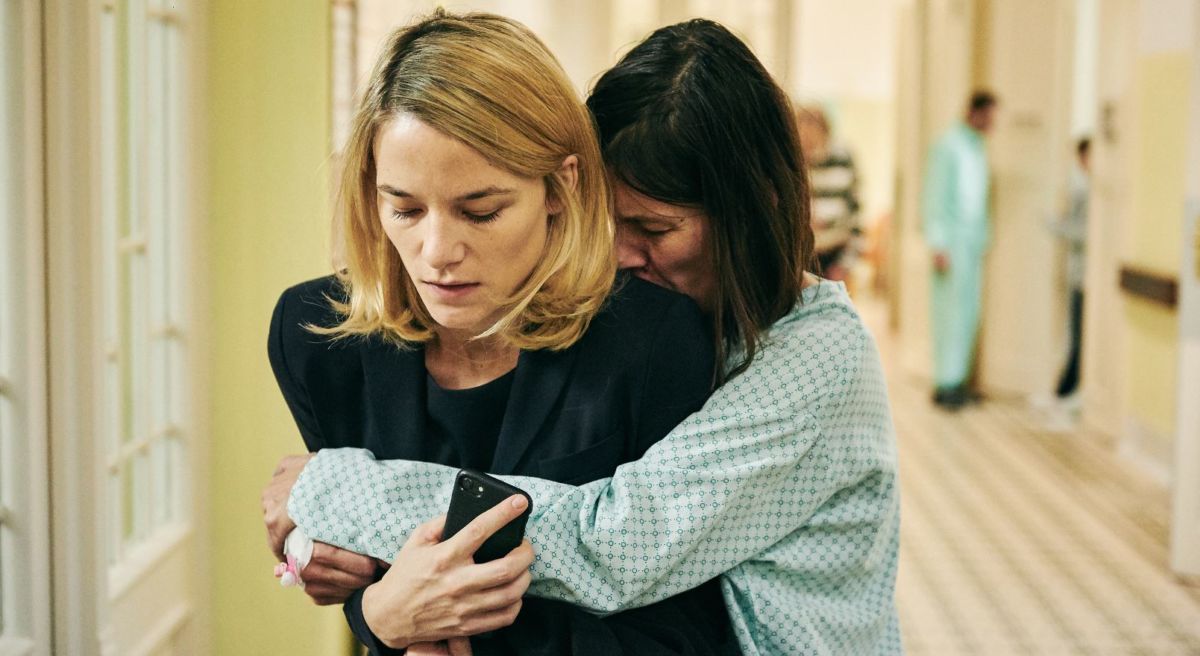The perils of workplace burnout are meticulously observed in The Ground Beneath My Feet, an oblique drama featuring a standout performance from Valerie Pachner. While grounded in real concerns about the dangers of working yourself to the bone, it’s hampered by unsatisfying mystery tropes which take the story out from underneath its feet. The way it uses mental illness feels cursory at best, exploitative at worst.
One hundred hour weeks are just a regular part of the job for Lola (Pachner), a business consultant who works on large projects abroad. Currently holed up in Rostock, where she stays in a hotel, we rarely see her wearing anything other than a trademark business suit with heels. Meanwhile, her sister Conny (Pia Hierzegger) has been checked into a mental institute in Austria after a suicide attempt. Diagnosed with paranoid schizophrenia, she’s convinced that the doctors are out to kill her. Lola assumes that it’s just another one of her episodes, flying back to work later that same day.
There’s an edge of Toni Erdmann to this particularly German tale, which sees how the modern workplace, the new substitute for traditional family, can often drift into the realm of the absurd. Being a woman can often double the exhaustion, as one must navigate the patronising expectations of men while battering away their sexual advances. She finds respite through an affair with her boss Elise (Mavie Hörbiger), who promises her big things if the project goes well. But soon the burden gets too much for Lola. Constantly jet-setting between Rostock and Austria, she slowly asks herself if she has the same problem as her sister.
It asks whether one’s compulsion to constantly work is something of a mental illness in itself. In the business there is a phrase known as a “48”, which means stacking two entire 24 hour days on top of each other in one massive shift. They are expected to be constantly on, answering phone calls no matter the time of day. All the while, her business is telling other companies how to be run, restructuring trade and organising layoffs. It’s taxing work, both physically and morally, Lola trying in vain to help both her business and her sister.
The moody soundtrack suggests a mystery-thriller, something the film never really delivers on despite familiar tropes like the mysterious caller and a mental institute that isn’t quite what it seems. These could’ve worked if they were more ambiguous and enigmatic, yet the way they are presented feels more confusing than anything else. The mental health tropes aren’t integrated naturally into the plot, with a final act that ends with cliché instead of genuine insight. It’s a shame, especially considering its keen observations of modern corporate life. It would’ve worked better without the sister in the picture at all. With so much richness in Valerie Pachner’s acting, moving between corporate composure and wild flights of fancy with ease, it needn’t have been hampered by its over-laboured psychological conclusions. Considering it’s a film about working way too hard, it doesn’t seem learn from its own central lesson.
Some of the coverage you find on Cultured Vultures contains affiliate links, which provide us with small commissions based on purchases made from visiting our site. We cover gaming news, movie reviews, wrestling and much more.



